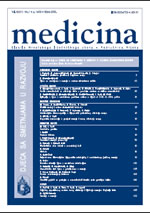
|
Medicina
Croatian Medical Association - Rijeka branch
ISSN: 0025-7729
Vol. 43, No. 2, 2007, pp. 132-137
|
 Bioline Code: me07018
Bioline Code: me07018
Full paper language: Croatian
Document type: Review Article
Document available free of charge
|
|
|
Medicina, Vol. 43, No. 2, 2007, pp. 132-137
| en |
Molecular Diagnosis Of Hepatitis C Infection
Grahovac, Blaženka & Hadžisejdić, Ita
Abstract
The World Health Organization recognized hepatitis C (HCV) as a global health problem estimated that in 1999, over 170 million people were chronically infected with HCV. HCV is leading cause of end-stage liver disease and hepatocellular carcinoma. The discovery of hepatitis C virus (HCV) in 1989 using molecular biology methods has led to the rapid evolution of the field of HCV diagnostics. Diagnostic tests for HCV can be divided into serological assays that detect antibody to HCV and molecular assays that detect, quantify and characterize HCV-RNA genome within infected patient. Qualitative molecular nucleic acid tests are used for confirmation of HCV infection and for screening blood donation. Quantitative HCV-RNA tests provide prognostic information for monitoring the response to antiviral therapy. HCV is heterogeneous virus with six distinct genotypes and numerous subtypes. HCV genotype tests are important clinically because they predict most accurately the chance of antiviral response and are routinely used for selecting treatment regimens regarding the duration of interferon therapy and ribavirin dosage.
Keywords
hepatitis C virus (HCV); HCV-RNA; HCV genotypes; molecular diagnostics
|
| |
| hr |
Molekularna Dijagnostika Hepatitisa C
Grahovac, Blaženka & Hadžisejdić, Ita
Svjetska zdravstvena organizacija (WHO) prepoznala je hepatitis C kao svjetski problem. Na osnovi procjena iz godine 1999., 170 milijuna ljudi bilo je kronično inficirano hepatitis C virusom (HCV). HCV vodeći je čimbenik neizlječivih oboljenja jetre, uključujući karcinom jetre. Za otkriće HCV-a godine 1989., zaslužni su molekularno-biološki postupci na kojima se zasniva suvremena dijagnostika hepatitisa C. Dijagnostički testovi dijele se na serološke testove kojima se dokazuju
anti-HCV protutijela, te na molekularne testove kojima se u inficirane osobe dokazuje, određuje i obilježuje HCV-RNA genom. Kvalitativni molekularni testovi primjenjuju se za potvrđivanje infekcije, te u kontroli darivane krvi. Praćenjem broja virusnih kopija, kvantitativni HCV-RNA testovi daju podatke o odgovoru na antivirusnu terapiju. HCV jest heterogeni virus koji se na osnovi genomske promjenljivosti svrstava u 6 osnovnih genotipova, te u više podtipova. HCV genotipizacija bitna je za kliničara, budući da se prema pojedinome genotipu može procijeniti odgovor na antivirusnu terapiju, a određivanjem HCV genotipa odabire se optimalni terapijski postupak vezan uz duljinu razdoblja terapije i dozu ribavirina.
hepatitis C virus (HCV); HCV-RNA; HCV genotipovi; molekularna dijagnostika
|
| |
© © 2007 - Croatian Medical Association - Rijeka branch
Alternative site location: http://hrcak.srce.hr/medicina
|
|
